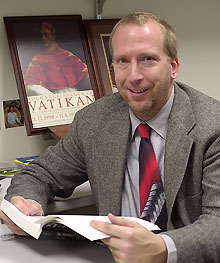For more archives, go to the Advance Archive/Search Page.
Humanities Fellow Studies
History Of Renaissance Papacy
It would be appropriate to call Kenneth Gouwens a Renaissance man.
 |
|
Kenneth Gouwens, an associate professor of history
and fellow of the Humanities Institute, is researching politics and religion
during the Renaissance. Photo by Melissa Arbo
|
After all, the associate professor of history graduated summa cum laude from Duke; has a joint doctorate in history and humanities from Stanford, where he received a Centennial Teaching Award; has had his translations of Latin for his first book praised by reviewers; has presented papers in Italian at conferences in Italy; can 'get by' in several other European languages; and plays a mean jazz trumpet and 'cocktail piano.'
But above all, his academic passion is Renaissance culture in general, and lately, the troubled papacy of Clement VII.
Gouwens came to UConn in 1998 from the University of South Carolina.
In 2002, he was selected as one of the inaugural fellows of UConn's Humanities Institute. "The institute's main purpose, other than giving visibility to the humanities here, is as a focal point for interdisciplinary activities," he says. "It's a great forum for 'talking shop' with a group of interesting minds with different approaches and areas of expertise."
But at the same time, he had also been awarded a coveted fellowship to the American Academy in Rome, the first UConn faculty member ever to receive that honor. Gouwens says Ross MacKinnon, dean of liberal arts and sciences, allowed him to accept the fellowship in Rome and defer the Humanities Institute award to this year. "It's ideal," he says, "because the Humanities Institute is a perfect environment for synthesizing the results of my research and, of course, for writing."
One coup for the Institute was hosting the New England Renaissance conference last fall. "That conference is over half a century old, but it had never before met at UConn," Gouwens says. "I was really glad we could do it, and it required institutional support. The Humanities Institute was absolutely key in providing the resources to make it a success."
In addition to teaching a graduate course on Renaissance culture, Gouwens' focus at the Humanities Institute is what he refers to as his 'Clement project,' organizing the materials for his upcoming book, Clement VII and the Crisis of the Renaissance Papacy.
Giulio de Medici "is a much maligned pope, for whom just about everything that could go wrong, did go wrong," Gouwens says of his protagonist. "His pontificate is often seen as marking the end of the Renaissance."
His cousin Pope Leo X had ex-communicated Martin Luther two years before de Medici assumed the papacy. As Pope Clement VII (1523-1534), de Medici was a patron of artists and intellectuals, including Michelangelo and Machiavelli, but there were also major political disasters: in 1527, troops of the Emperor Charles V sacked Rome, and held the pope prisoner for six months.
Clement was also the pope who got to tell Henry VIII of England "that he wasn't going to get his divorce," as Gouwens describes it, from first wife Catherine of Aragon.
In his office, Gouwens has copies of two portraits of Clement by Sebastiano del Piombo that were painted five years apart. The differences are striking - a vigorous and self-assured leader who then becomes a worn and beaten man.
"You have to ask 'What happened?'" Gouwens says. "Clement's contemporaries sure did. In fact, one of Machiavelli's friends famously wrote that Giulio de Medici had 'endured a great labor to become, from a great and respected cardinal, a small and little-esteemed pope.'"
But it was Clement's dealings with the city of Florence that soiled his political reputation: "In 1529-30, he cut a deal with Charles V to have Florence besieged by an imperial army, just to put his family back in power there. And the most influential historians of the period were Florentine." It was, says Gouwens using a more modern expression, "a PR nightmare."
Gouwens' first book, Remembering the Renaissance: Humanist Narratives of the Sack of Rome, was selected by Choice, a review journal, as an Outstanding Academic Book of 1998. "I was happy with how it turned out," Gouwens said, "but its focus was narrow. This one will have a more interdisciplinary scope, and I'd like it to speak to a wider audience."
The American Academy Fellowship brings 30 people a year to Rome - 15 academics, and 15 people in the arts, such as poets, painters, musicians, and performance artists. "It was a unique opportunity," Gouwens says. "I put in a lot of hours at the Vatican Archives, but also got to benefit from the one-of-a-kind community that the Academy provides - and, of course, from being in Rome."
He is relishing his time at the Humanities Institute as well. "It's a major step for UConn to have this kind of center," he says. "It's building bridges among the departments, and increasing our profile beyond the institution. It's already making a vital contribution to the intellectual community. And this is just the beginning!"

